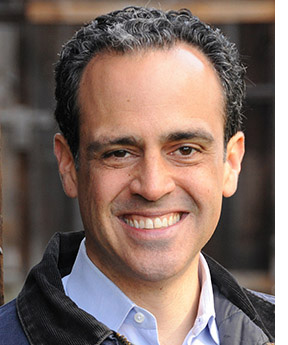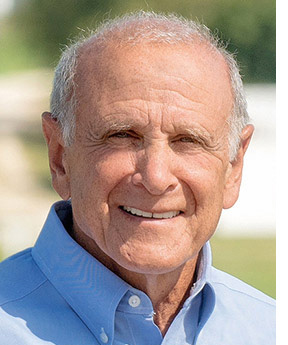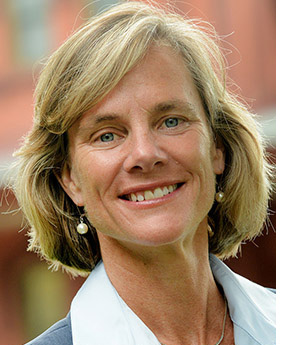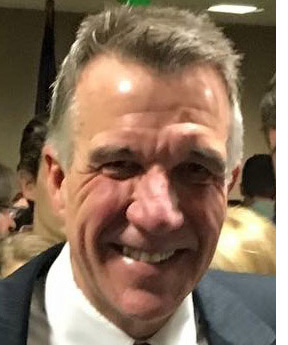| Matt Dunne (D) |
Resides: Hartland with wife and three children.
Professional background: Served seven years in Vermont House of Representatives; worked for White River Junction Chamber of Commerce; ran AmeriCorps*VISTA; served in Vermont State Senate while creating engagement programs at Dartmouth College; runs Google’s Community Affairs department.
Committees served on: Vermont Arts Council; Windsor County Court Diversion; New England Board of Higher Education; Vermont Infrastructure Bank; Vermont Film Commission; Dartmouth Hitchcock Medical Center.
Website: www.mattdunne.com
Economics & Business: I am most concerned about the growing inequities in our state. One: as governor I will close the gender gap and pass the toughest equal pay law in the country. Two: I will pass a livable minimum wage that is $15 per hour. Three: we have a childcare crisis; I will raise the income threshold for the childcare subsidy and get rid of the income cliff that disqualifies families who are even $1 over the income limit. |
 |
Four: I will pass paid family leave so that no Vermonter has to face the impossible choice of holding onto a job or caring for a newborn or loved one. Five: I will deploy antipoverty measures like those I implemented at Americorps*VISTA, including job training and microfinancing to give Vermonters loans to start small businesses. Six: My Green Jobs Initiative uses a bond to put hundreds of Vermonters to work weatherizing older apartment buildings. Part of the savings in energy costs will go directly to tenants in lower utility bills, and part will go to pay down the bond.
Health Care: After eight years at Google and more in the IT sector, I have the experience to fix the Vermont Health Connect website once and for all. But we can’t stop there—a fair and equitable Vermont means quality health care for all. I will deliver universal health care and convert the costly, outdated method of paying doctors and hospitals for the volume of procedures they do to paying for the public health, with clear parameters and accountabilities.
It starts with making sure everyone has a primary care doctor. When my younger brother Josh suffered a stroke, he had no primary care doctor, which made a terrifying situation even more confusing and stressful. I will make sure every Vermonter has a primary care doctor to manage preventative care and coordinate with specialists, so families do not have to struggle in an emergency or battle confusing hospital protocols. We must transition to a universal health-care system and embrace the truth that health care is not a privilege for some, it is a human right for all.
Principles & Values: The values I hold dear are inspired by my family. My parents were activists and raised me to fight for what is right and fair—particularly on behalf of those who cannot advocate for themselves. But I am also inspired by my Vermont upbringing for another very personal reason. My dad died of cancer when I was 13, and my mother—the first woman to achieve tenure at Dartmouth College—became our family’s only breadwinner overnight. Her courage was a huge source of strength and motivation, as was the care provided for us by our Hartland community. They made us dinners for weeks and drove my brother and me to school and lessons. They are the reason I ran for office right out of college, and they elected me because they knew my values and work ethic.
I believe in hard work and creative ideas and looking at systems holistically, which is what drove me during 11 years as a legislator. I have tremendous optimism for our state. Together we can achieve pay equity for women, equal access for all our people to quality health care, and a minimum wage that people can actually live on. And that’s only the beginning—our best days are ahead.
|
|
| Peter Galbraith (D) |
Resides: Townshend.
Professional background: Taught at Windham College in Putney; worked as staff at the Senate Foreign Relations Committee; served as the first US ambassador to Croatia and with the United Nations in East Timor and Afghanistan; served two terms in the Vermont Senate from Windham County.
Committees served on: Trustee of Marlboro College; Board of Grace Cottage Hospital Foundation; Center for Arms Control and Nonproliferation; trustee of the American University of Kurdistan.
Website: galbraithforvermont.com
Economics & Business: Increasing the minimum wage to $15 an hour will be my top priority as governor. Low-wage Vermonters have the most trouble making ends meet. A 50 percent pay raise for these workers is the most effective antipoverty program that Vermont can adopt, but it will also provide a stimulus to the Vermont economy as low-wage earners spend all their extra income and tend to spend it locally. A higher minimum wage is also good for taxpayers who currently subsidize low-wage employers through programs like the earned income tax credit and other public assistance. |

|
Someone who works 40 hours a week should make enough to not need public assistance to survive. Low-wage workers are disproportionately women, so the higher minimum wage will increase opportunities for low-income women and their children. I will also seek to end practices that disproportionately affect women employees, such as misclassification of workers.
Health Care: Health care is a human right. As a senator, I introduced an amendment (Proposition 1, 2011) to incorporate the right into the Vermont constitution. I am the only elected official in Vermont to offer legislation to finance Act 48, Vermont’s single-payer health-care program. As governor, I will move toward the goal of universal, publicly financed health care. This can be done through a subsidized public option on the exchange, by providing publicly financed primary care for all or by covering all Vermonters 26 and younger under through Dr. Dynasaur. The exact choice of option will depend on waivers to use federal funds. I have learned from the Shumlin health-care debacle that no health-care proposal should be taken seriously unless there is also a financing plan. I propose to finance the option that I choose with a payroll tax of 2 to 2.5 percent.
Principles & Values: I have extensive experience in managing large organizations (US embassy in Croatia and a 5,000-person UN mission in Afghanistan) and in crisis management (as one might imagine, it was more or less a nonstop crisis in Afghanistan and Croatia/Bosnia). As a senator, I saw first-hand how the special interests in Montpelier prevailed too often over the broader public interest. I think the combination of management experience in tough circumstances and an understanding of what needs to change in Montpelier will serve me well if I am elected governor.
As a diplomat working on war and peace issues, I faced challenges that were both personal and professional. In wartime Croatia and Bosnia, I spent hours with women, men, and children who survived mass executions, starvation conditions in prison camps, and gang rapes. I then had to negotiate peace with the men who had ordered these crimes. As I prepared the drafts of the peace agreements, I inserted provisions on human rights and justice. Since the perpetrators always insisted they had not committed any crimes, I was able to keep these in the final peace document. I had the great satisfaction of then testifying against my negotiating partners at the international court in the Hague.
|
|
| Bruce Lisman (R) |
Resides: Shelburne with wife.
Professional background: After college, began professional career in financial services in New York, working way up from file clerk to cohead of global equities, serving clients in traditional stock brokerage.
Committees served on: Founded Irving Lisman Scholarship Fund and Campaign for Vermont; lead supporter of Boys & Girls Club of Burlington’s Early Promise Program; UVM Board of Trustees from 1996–2004, chair 2000–2002; chair of the board of American Forests.
Website: www.lismanforvermont.com
Economics & Business: Fixing Vermont’s economy is a big task that requires persistence rather than catchy slogans or expensive new programs. First, I will bring the state budget and taxes under control, giving employers the confidence to expand and assuring young Vermonters that they can afford to stay here and raise a family. I will build constructive relationships with our employers. |
 |
Rather than look at them as sources of revenue, we will approach them as partners—helping them access the resources to thrive and removing obstacles to growth. I will help better connect state college graduates to Vermont employers with apprenticeships, internships, and entrepreneurship coaching. I will coordinate our economic development programs under one team, which will be accountable for the success of that effort.
Education: Vermont’s school system is doing well by some measures, but we can do much better. I will push for excellence in the classroom, while also insisting that we control costs and move to more transparent and sustainable financing system. I will repeal Act 46, which forces school consolidation, threatens school choice, and imposes arbitrary spending caps. There is no evidence Act 46 will save money or produce better outcomes for students. We can achieve significant savings without compromising educational opportunity or disruptive mergers. A detailed study commissioned by the legislature identified $164 million in savings. Reducing administrative redundancies, reforming the special education funding model, and bringing our low student-staff ratio in line with other high-performing school systems would get us there.
Principles & Values: I learned early that surrounding myself with the best talent you can find is very important and then intently listening to others would provide some of the best ideas for moving an organization in a better direction. Together, with my team we grew our division from $50 million to $2.3 billion in revenue. I managed 2,350 people with another 1,000 in support. Our success did not happen overnight—it was the result of nearly 40 years of persistent hard work and an optimistic outlook that tomorrow will always be better than today. I will carry my skills and work ethic with me in my services as governor of the State of Vermont. I will lead our government by establishing goals and providing steps to meet them and will be transparent and accountable with all Vermonters about how we are doing by measuring outcomes.
I became a single parent in 1999 after my late wife lost her nine-year battle with breast cancer. We tried everything you can imagine to find a cure, but no amount of effort could save her. My two beautiful daughters, Kate and Maggie, were just 8 and 5 when their mom became ill. I was so fortunate to work in an environment that allowed me the opportunity to take the time I needed to care for my daughters, support them, and help them to grow into the beautiful, strong women they are today. This tragedy brought us closer together; we share a special bond. Today I am married to my best friend, Kyla, a wonderful hard-working person who has just recently launched a new company. We live in Shelburne with our three dogs.
|
|
| Susan Minter (D) |
Resides: Waterbury Center with husband and two children.
Professional background: Served in a variety of roles in the State of Vermont: community planner/downtown revitalization coordinator in Agency of Commerce; Vermont representative; deputy secretary of Transportation; secretary of Transportation; Irene Recovery Officer.
Committees served on: American Red Cross Board (VT); Vermont Planners Association; Vermont Public Research Group; Advisory Board of EmergeVT; Waterbury Children’s Room; Waterbury Planning Commission; Economic Development Committee of Revitalizing Waterbury.
Website: www.sueminter.com
Economics & Business: Our greatest economic challenge is that the middle class is shrinking, income inequality is expanding, and poverty—with all its associated challenges—is growing throughout Vermont. We need to change the story for Vermont’s women and families. |
 |
We need to grow Vermont’s economy to create livable wage jobs, strengthen communities, and help our next generation, work, play—and stay—in Vermont. My administration will focus on fighting for equal pay, paid family leave, increasing the minimum wage, and expanding access to quality childcare and early education, as well as postsecondary education.
I propose two new economic growth programs, InvestVT and InnovateVT. InvestVT will follow the model for success in Barre where a strategic investment created 350 new jobs and the opening of 24 new businesses since 2011. In my first year in office I will identify three communities in need of economic stimulus who are committed to making a positive change in their downtowns.
InnovateVT will create task forces that harness four industry sectors: clean energy and efficiency, farm and forest production, the tech industry, and the next generation of manufacturing. Each task force will recommend strategies, goals, and benchmarks to continue growth in these critical areas.
Environment & Agriculture: I will be a strong environmental steward—as I have throughout my professional career. I will focus on smart growth and clean water—both addressing pollution in Lake Champlain and other surface waters, and also our groundwater and drinking water. I will continue Vermont’s leadership in addressing climate change—the greatest threat to our planet. As we all learned from Tropical Storm Irene, climate change is not just real—it’s here. We will continue to transform our energy economy to get off of the carbon economy and grow jobs and opportunity in renewable energy and efficiency. As a member of President Obama’s Climate Change and Resilience Task Force, I worked with leaders nationwide to address the devastating impacts of our changing climate. As governor, I will continue to be a leader in making sure Vermont and our region is more prepared for the disruptions ahead.
Principles & Values: I am a working mom and know our families need security and a strong start. And women need equal access to opportunity—something that is clearly denied them today. As governor, I will focus on children and families.
As a professional planner, I bring an understanding that we must think holistically about the future and our actions. As a former legislator, I know that our democracy works best when we listen and respect those with whom we may disagree in order to find common ground and solve problems. I will be a governor who seeks understanding and the ability to work together. As the former secretary of transportation, I understand the critical role that government plays in our communities and our state. I know government needs to function well, be efficient, provide excellent service, and demonstrate value and results for the taxpayer.
As the Irene Recovery Officer, I worked with Vermonters at their toughest times, and I know what we are capable of as a state. I know that Vermonters care deeply about one another and about their state and that when Vermonters come together, united by a common mission we can do great things. I am a collaborator and a team leader. I know that government cannot solve everything, but must be a strong partner with all social and economic sectors.
|
|
| Phil Scott (R) |
Resides: Berlin with wife
Professional background: After college, opened motorcycle repair shop; worked for uncle at DuBois Construction, working way up from day laborer to co-owner of the company; elected to the Vermont Senate in 2000, representing Washington County for five terms; elected lieutenant governor in 2010, served three terms.
Committees served on: Founded Wheels for Warmth Program; president of Associated General Contractors of Vermont; vice chair of Senate Transportation Committee; chair of Senate Institutions Committee. .
Website: www.philscott.org
Economics & Business: My top priority is to build a more robust economy that keeps and attracts working-age families, employers, and innovators and makes Vermont more affordable. To do this, I’ll stay focused on the fundamentals: if legislation decreases the costs of living in Vermont, I’ll support it, and if it increases costs, I’ll resist it. Government efficiency and predictability are also necessary for progress. |
 |
So we will not overpromise, and public policy will be about getting clearly defined results. Finally, we will invest in progrowth areas like job training, higher education, technical education, and road and telecommunications infrastructure.
Education: We need to increase wages and opportunities while reducing the cost of living, and education reform is an important part of that solution. Over the last 20 years, enrollment has declined while fixed costs have risen. Structural reform has to happen to get property taxes under control and also continue to invest in kids and classrooms. We need to have the tough conversations about consolidation, while also improving Act 46 to allow communities to keep what they save from mergers instead of sending it back to Montpelier. We also need to encourage more innovation, through flexible and individual learning plans, sharing resources, and making better use of technology.
Health Care: My first priority in health-care reform is to transition away from Vermont Health Connect. The system is still not fully functional and plans are unaffordable to many. I’ve repeatedly called for a transition to a better, less costly model that allows Vermonters to buy lower-cost health insurance from the federal Exchange or approved multi-state partnership Exchanges that offer more affordable choices. We also need to return savings to Vermonters, and share our successes in cost containment with the businesses and families that pay insurance premiums.
Principles & Values: I have always been a hands-on learner. To grasp a new skill, I have to experience it; that was the inspiration for my Vermont Everyday Jobs Program. To solve a problem, I need to fully understand it, so I seek out firsthand testimony to “hear all sides of the story.” The fact that I listen, learn, and lead—rather than thinking I always have all the answers—is probably the most unique qualification I have to be an effective governor.
In January 2012, we lost our business infrastructure due to a devastating fire. Later that year, many Vermonters faced losses of similar scale from Tropical Storm Irene. In both disasters, I was able to draw upon relationships I had built over many years in order to solve problems quickly and economically. At DuBois, many other construction companies—some of them competitors—offered to lend us equipment to get us through the aftermath. After Irene, I leveraged friendships forged at the State House and throughout the business world to get water filtration and fire protection equipment to isolated towns, remove debris blocking major roadways, and remove nearly 100 destroyed mobile homes. These examples show the tangible value of a leader who works with allies and competitors alike in order to accomplish the greater good.
|
|